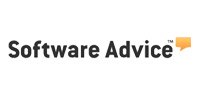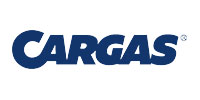View the Top Dynamics 365 CRM Reviews
This review contains:
-
What Is Dynamics 365 CRM?
-
The Pros and Cons of Dynamics 365 CRM
-
How Does Dynamics 365 CRM Measure Up to the Competition?
-
What Do the Experts Say?
-
Dynamics 365 CRM’s Price and Value
Important: Some review sites cover the entire Dynamics 365 CRM platform, while others split up reviews based on the individual module. Be sure to verify whether you’re looking at feedback for one part of the platform or the entire suite.
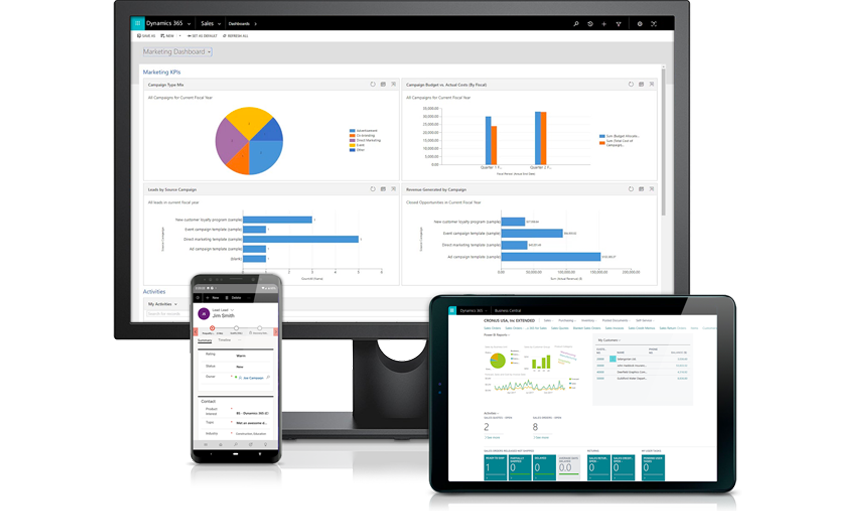
What Is Microsoft Dynamics 365 CRM and What Does It Do?
Bottom Line: Dynamics 365 CRM is Microsoft’s suite of cloud-based applications for sales, marketing, and customer service.
The Benefits of Dynamics 365 CRM
Bottom line: Microsoft Dynamics 365 CRM excels because of its centralized data, integrations, cohesion across platforms, customization and configurations, and unique features like the Advanced Find tool.
Centralized Data
All three CRM modules centralize data in the cloud to keep it organized and accessible. Your sales, marketing, and customer service teams can work from the same client profiles and update that info in real time. This structure breaks down silos and lets your departments collaborate and build off each other’s work.
Data unification also makes analysis and reporting easier. You can search the Sales module like an SQL database, grab the data you need, and export it to a report for distribution throughout your company.

“The impact of Dynamics 365 on my business has been the elimination of data silos, automation of critical processes, and the ability for me to make decisions based on real-time data,” said a Capterra reviewer.
Integrations
Dynamics 365 integrates with a wide variety of software both within the Microsoft platform and in the broader market, increasing its versatility as a solution. It comes with pre-built integrations to Microsoft 365 and its collection of tools such as Outlook, PowerPoint, and Excel. You can effortlessly send information from these programs to Dynamics 365. For example, you can add new activities to a customer’s account from an Outlook email chain.
Dynamics 365 also has built-in integration with Power BI, which provides advanced predictive analysis tools. This integration shows sales insights that you may not have noticed before. All these Microsoft tools and more can be part of your Dynamics 365 Sales solution, with additional third-party apps available at Microsoft’s AppSource hub.
If your preferred business solution doesn’t have an existing integration, no worries. The right Microsoft partner can help you build a custom integration.
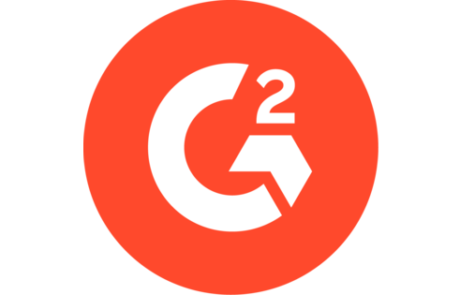
According to a G2 review, “It is designed to be user-friendly for sales teams, offering seamless integration with other Microsoft applications like Microsoft 365 through the Cloud, as well as the Power Platform. This integration provides a unified and comprehensive solution for managing sales activities, enhancing customer experience through active engagement, and ultimately driving business growth.”
Cohesion Across Microsoft Platforms
The Dynamics 365 user interface is similar to Microsoft’s other product interfaces. Menu options appear in a user bar on the lefthand side of the screen, and the bar tracks which account or contact you’re currently working with. This helps you follow your workflows and find information more easily within the system, which means less time spent on routine tasks—and more time spent on essential projects.
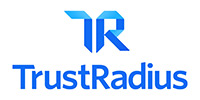
“The usability is easily adopted for users familiar with other Microsoft products. Dynamics 365 has several interfaces that cross over browsers and tablets,” says this TrustRadius reviewer.
Customization and Configuration
Microsoft includes built-in configuration capabilities for its CRM solutions to adjust workflows, create automations, and develop custom reports and dashboards. Advanced customization beyond the scope of these built-in features is available through Microsoft’s .NET developer framework and the software’s xRM capabilities. However, customization can get very technical, and it’s recommended to reach out to a reliable partner for assistance.

“I like that you can customize your business process flow or sales cycle to meet the specific industry that you are in,” said this G2 reviewer of Dynamics 365 Sales.
Unique Features (Sales)
The Sales module is the top choice for companies investing in Dynamics 365 CRM, in part because of its unique features. One of the most popular features is Advanced Find, which helps you generate complex searches using every field and category present in the system. With the ability to be as specific as you need, you can select whatever subset of your data you want to evaluate and quickly translate it into a report. Features like Advanced Find set Microsoft’s CRM platform apart from others in the space, especially for sales-focused teams.

“The best feature of it and the one I found most efficient is Advanced Find. By using Microsoft Dynamics 365 Sales it is easy to track cases and form useful reports,” according to this G2 review for Dynamics 365 Sales.
The Drawbacks of Dynamics 365 CRM
Bottom line: Despite its integrations and customizations, Dynamics 365’s user interface, rigid configuration, price tag, segmented functionality, and steep learning curve may not benefit some businesses.
User Interface
Dynamics 365’s default UI will be easy to learn if you’re familiar with Microsoft’s user interface. But if you’re transitioning from other CRMs or don’t regularly use Microsoft products, it may take time to adjust to the layout.
Scroll bars and irregular window sizes can lead to awkward field and data displays for some users. For others, the interface might seem out of date, lacking the polish and visual unity of its competitors.
The user interface may help or hinder operations depending on what is enabled or disabled during the implementation process. If your Microsoft partner configures your software based only on standard practices rather than your company’s unique needs, the user experience may be insufficient. Choosing a Dynamics 365 partner who takes the time to understand your business processes is crucial to getting the most out of the system.

“The dashboard could use an upgrade for better user experience. The current layout makes it difficult to quickly access and display key metrics,” says this Capterra review of the Dynamics 365 platform.
Complex Configuration
While Dynamics 365 is customizable during the setup process, your software settings are hard to adjust once the system is in place. If your needs as a business ever change, the solution might struggle to adapt to your company’s new processes.
It’s crucial to understand how the configuration will impact your business and the way the software works. Before you implement any Dynamics 365 CRM modules, you should consult with a Microsoft partner about the exact workflows you need the software to handle. Your Dynamics 365 partner can also help you understand what your company needs now, what you will need in the future, and how the solution can be tailored to grow alongside your business.

According to this Capterra review of Dynamics 365 CRM, “The capability that allows us to adapt and develop solutions, brings with it a complexity that needs a lot of configuration and development. We needed Microsoft partners to get us to where we needed to be.”
The Price
Dynamics 365 CRM is reasonably priced for a mid-market or enterprise company, but it might be too expensive for a small business looking to upgrade its CRM. And even if the sticker price seems affordable, the subscription cost is subject to change, and additional fees for training, implementation, and integrations will vary among Microsoft partners. Microsoft does offer discounts to businesses that purchase multiple solutions, but the cost can still add up.
If you’re shocked by the price of Dynamics 365 CRM, it may be that mid-market software is not the right fit for you. Try looking into small business CRM solutions for sales and marketing to evaluate other pricing options.

One Capterra review of Dynamics 365 CRM says, “The least appealing aspect of Dynamics 365 is its complex licensing structure, which can be confusing and expensive, making it challenging for businesses to choose the right plan and manage costs effectively.”
Segmented Functionality
The three Dynamics 365 CRM modules are designed for their respective departments without much overlap. For instance, Dynamics 365 Sales is designed for sales teams and their specific contact management needs. While the system can track marketing lists, most other marketing functionality is not available in this particular application. It’s easy to integrate Sales and Customer Insights, but this comes at an increased cost compared to just investing in the Dynamics 365 Sales module. This is the case with other modules in this CRM suite—if you want well-rounded capabilities, you’ll need to invest in multiple solutions.
Segmentation is also prevalent in the Customer Insights module, which was originally two separate solutions known as Customer Insights and Marketing. Some reviews have mentioned that the feature gap is still prevalent within the software.
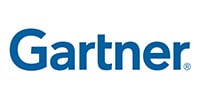
“This product is sold as one, but it is in fact two products, and there is a fairly wide gap between the two making the user experience less than optional,” says one Gartner reviewer of Customer Insights.
Steep Learning Curve
Dynamics 365 is a little harder to learn than most other CRMs due to its wide range of features. Even if you understand the software, it’s easy to get overwhelmed and confused by the program’s powerful yet complex systems. Additionally, while Dynamics 365 Sales’ standard Microsoft UI is familiar to experienced Microsoft users, it is slightly different from most other CRM offerings on the market and may take some getting used to. The number of online training resources provided by Microsoft may be minimal, but your local Microsoft partner will often offer additional resources and training.

According to one G2 review of Dynamics 365 Sales, “Dynamics can have a bit of a learning curve due to the extensive tool sets that are available. However, the user experience can be 100% controlled by the implementer. Additionally, some tools can be complex initially but there is always a very good reason why a tool has been designed to operate the way it does.”
Is Dynamics 365 CRM a Good Fit for My Business?
Bottom line: Dynamics 365 CRM is a good fit for businesses in various industries, particularly mid-market companies, companies with large sales divisions, and Microsoft-based offices.
Budget
Dynamics 365 CRM uses a subscription model where users pay a monthly fee for the software. For Sales and Customer Service, it’s priced per user and comes in different licenses based on the functionality you want, so pricing varies from customer to customer. Customer Insights is priced using a monthly flat fee per organization, or “tenant,” with most businesses only requiring one instance of Customer Insights.
Your Foundation
If your office predominantly uses Microsoft products for daily tasks, Dynamics 365 will fit seamlessly into your existing environment. The solution integrates with tools like Outlook, Excel, and Power BI to increase your system’s power and efficiency.
If your everyday processes mainly operate on non-Microsoft programs, Dynamics 365 CRM may not be able to reach its full potential, and another CRM solution might prove a better fit.
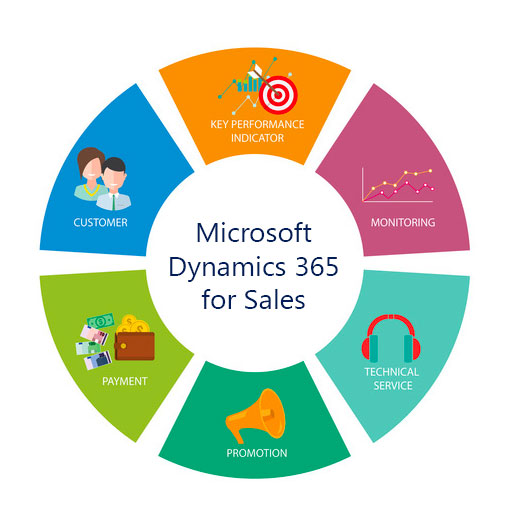
Capabilities
While the Dynamics 365 CRM platform covers the same functions as most other CRM solutions, its core focus is sales. This makes the software a better fit for companies with a large or expanding sales division. If your company focuses on marketing, you’ll want to consider software from marketing-minded companies like HubSpot.
How Does Dynamics 365 CRM Measure Up to the Competition?
Bottom line: Dynamics 365 sets itself apart from other CRM providers with its unique commitment to the Microsoft platform, partner network, and deployment flexibility.
What Do the Experts Say?
Bottom line: Microsoft’s Dynamics 365 CRM suite, particularly the Dynamics 365 Sales module, is recognized throughout the industry as a leading product with high customer satisfaction.
How Much Does Dynamics 365 Cost and Is It Worth It?
Bottom line: Dynamics 365’s price and value will vary based on your business needs and the modules you select. Use our Pricing Calculator to estimate your costs.
The Software
Microsoft is very transparent about its user license pricing, so you can easily calculate your software costs based on the number of users you want or need. For example, a small team of 5 users on Microsoft’s Sales Professional license will spend about $3,900 annually, while a large team with 20+ users on Microsoft’s Sales Enterprise license will spend about $25,000. Our Dynamics 365 CRM Pricing Calculator breaks down the cost of implementing and using Microsoft’s sales, marketing, and service modules.
The Implementation
Your implementation costs will vary depending on your chosen Microsoft partner and your business needs. Implementation typically starts at $25,000. Our Dynamics 365 CRM Pricing calculator breaks down the cost of implementing and using Microsoft’s sales, marketing, and service modules.
The Value
Dynamics 365 CRM meets the needs of mid-market companies that have outgrown the capabilities of their current small business solutions. Dynamics 365 helps your business by providing:
Rapid growth. As your company grows, so does your customer base. Beyond a certain point, keeping track of all customer accounts and associated products and services might be unwieldy using small business software. Dynamics 365 CRM helps you manage your existing customer base and leads with the Sales module, marketing campaigns with the Customer Insights module, and support tickets and knowledge base with the Customer Service module.
Better reporting and analysis. With increasing amounts of data, the time it takes to prepare reports and statistics increases exponentially. This makes it hard for you and your executives to know the outcomes of your decisions and plan future growth. With Dynamics 365 CRM’s powerful tools and integrations, you can slice up your data whatever way you need to and learn things about your company’s metrics you may have never considered. This information can be exported to Excel or PowerPoint and presented however you desire, letting you guide your business better than ever before.
About Us
Cargas is an employee-owned software, consulting, and payments company with nearly 200 employees offering ERP and CRM software from Microsoft, Sage, Salesforce, HubSpot, and Acumatica as well as proprietary software for fuel delivery, HVAC service, and payment facilitation. Cargas sells the software, sets it up, teaches customers how to use it, and helps them adapt it as their needs change over time. Cargas’ products streamline processes in accounting, supply chain management, and sales and marketing so customers can focus on what’s most important—growing and running their businesses.
Through its unique employee-owned culture, Cargas fosters a commitment to excellence, a dedication to teamwork, and a high level of customer care. Established in 1988, Cargas has continuously been recognized as a Best Place to Work and a Top-Growing Company.


Let’s Chat
Still have questions? Get in touch with our expert team of software professionals.



